US Congress Epstein files release vote. Lawmakers in both chambers approve legislation requiring public disclosure of documents tied to the Epstein investigation after Trump shifts position.
Congress Passes Epstein Transparency Bill With Overwhelming Support
In one of the most decisive votes seen in recent years, the House of Representatives and the Senate have approved a bill that instructs the Justice Department to publish a large set of documents connected to the federal investigation into Jeffrey Epstein. The vote reflects broad pressure from the public and a rare moment of unity between Democrats and Republicans.
The “Epstein Transparency Act” cleared the House with a near unanimous margin and moved quickly through the Senate. The legislation now awaits President Donald Trump’s signature, which officials believe is likely given his recent comments supporting the release. Once enacted, the Justice Department will be required to disclose emails, call logs, financial trails, internal reports and related case material, subject to limited redactions for ongoing legal activity and victim protection.
Trump’s Sudden Shift and the Politics Behind It
Only days earlier, senior White House aides argued that releasing the files could distract from core policy priorities. Trump himself was against the move, claiming it would create unnecessary political noise.
That stance changed following a wave of support inside the GOP and a petition signed by more than three hundred House members that forced the bill toward a floor vote.
Trump later announced on Truth Social that Republicans should back the release and that he supported moving the issue forward so Congress could refocus on the economy and the coming election cycle. According to insiders, the shift came after frustration within the party grew over the constant speculation surrounding the material. Strategists believed that opposing transparency risked appearing defensive at a politically sensitive moment.
A Bipartisan Moment With Potential Consequences Across Washington
Democratic and Republican leaders both framed the passage of the bill as a victory for transparency, though for different reasons. Some GOP lawmakers suggested that the release could help dispel narratives tying Trump to Epstein, while Democratic officials framed the vote as a long overdue step in a case that has produced years of secrecy and public distrust.
Survivor advocates also welcomed the vote, arguing that full disclosure is essential to reveal whether high profile individuals were shielded from scrutiny. Congressional staff expect that the disclosures could influence the political landscape ahead of the 2026 elections, depending on the names and details contained within the files.
What the Files Could Reveal and Why Experts Urge Caution
Legal specialists note that releasing the documents could clarify many unanswered questions surrounding Epstein’s network of contacts. Analysts believe the files may contain correspondence with powerful political, business and academic figures, including communications involving past administrations.
However, experts also warn that the release poses risks:
- reputational harm to individuals mentioned in documents without context
- renewed scrutiny of the Justice Department’s earlier decisions
- the possibility of new investigations if significant information is uncovered
- concerns over privacy and fairness for survivors
Some lawmakers have raised the possibility that a new federal probe could limit immediate disclosure, since ongoing investigative privilege may apply to certain categories of material.
Survivor Groups Push for Stronger Safeguards
Advocates for Epstein survivors say the Congressional vote is only the first step. Legal groups are urging the Justice Department to handle the release carefully, prioritizing redaction of sensitive personal data and shielding victims from renewed public attention.
Several organizations held vigils and press conferences on Capitol Hill following the vote. Speakers emphasized that transparency must not come at the cost of survivor safety. They are also calling for additional reforms, such as stronger protections for whistleblowers and improved monitoring of human trafficking cases.
What Comes Next
With Congressional approval complete, the process now moves to the executive branch. Here is what to expect:
- The bill is projected to reach Trump’s desk by Friday.
- Once signed, the Justice Department will have sixty days to release all non exempt documents.
- Senate committees are reviewing possible follow up amendments to reinforce privacy protections.
- The disclosures may trigger new investigations or hearings depending on what surfaces in the files.


